Meet Frank, the horse who saved me
IN A world of chaos, violence and mental anguish, an ageing racehorse saved from slaughter became an oasis of calm and joy. He’s an animal I will never forget, writes Sherele Moody.
Rendezview
Don't miss out on the headlines from Rendezview. Followed categories will be added to My News.
FIVE years ago, a starving broken down old nag unexpectedly came into my life.
My partner and I discovered the 29-year-old horse penned in a rough and tumble set of wooden horse-yards just metres from a rubbish tip on the outskirts of Brisbane.
I’ll never forget watching this grumpy stompy bundle of brown hide and angular bones hungrily mouthing the barren dust bowl, seeking a stray blade of grass to satisfy his rumbling tummy.
He had a one-way ticket to the glue factory — just another unwanted and unloved horse surplus to an uncaring owner’s needs.
Despite the betrayal of previous humans, the old bloke pushed his way through the other horses and made a beeline towards us, hoping — I like to think — that we would feel pity for him and take him home.
We knew a slaughterman would soon hold a bolt gun to his head and pull the trigger and this was something neither of us could live with.
As often happens when emotion rules intellect, we paid far too much for him but if we knew then what we knew now, we would have given so much more to have him in our lives.
We had no idea about his history.
He didn’t even have a name.
We decided, if he were an old man he would have an old fashioned name.
So we called him Frank.
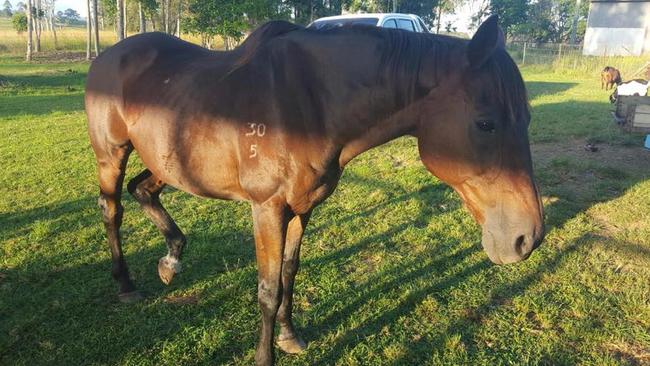
The dried and crusting sweaty saddle marks on his tummy, around his girth and across his bony wither meant he had recently been ridden, probably right up to the day he was sent on his final journey towards equine misery.
The brands on both his shoulders revealed he was a thoroughbred born in 1984 — there is no doubt someone bred Frank to race.
It is quite probable that he went around the track until he was no longer making his owners money.
Often when racehorses “retire”, they become show jumpers, hacks for pony clubbers and they may even spend the rest of their rideable lives serving as mounts at horseriding ventures.
Those without a future end up in cans of dog and cat food or their carcasses are shipped off to the European restaurants where horsemeat is all the rage.
It is rare for thoroughbreds to live three decades — I suspect Frank’s fighting spirit and his canny intellect ensured he survived long enough to fall into our lap.
Age did not weary him at all. When he galloped, it was flat out — a swift shadow of his younger self racing to finish first past the post.
If he was feeling extra frisky he’d kick his back hoofs up and flick his head around, the whites of his eyes showing — looking every bit a highly-strung stallion flaunting his prowess to a herd of mares. I reckon Frank had no idea he was castrated as a young fellow, but who was I to shatter his dreams.
Frank’s perfectly sculpted face was as handsome as it was long.
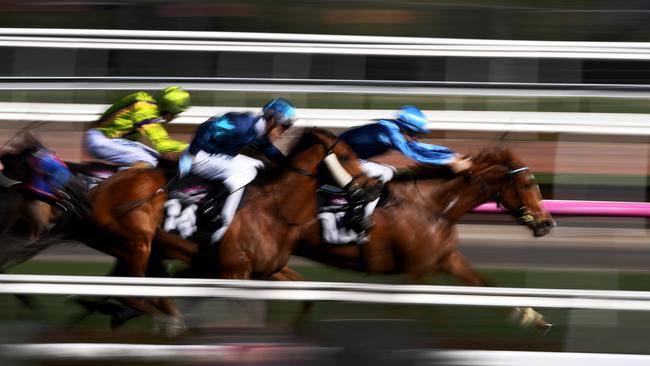
They say the eyes are the windows to our souls and this was certainly true for him. Those beautiful and mysterious deep brown pools of mystery — ringed by dark lashes and soft wrinkle lines — were sad, wise and just a little bit mischievous.
His bay coat was rough and woolly in winter, but in summer it transformed into a velvety smoothness.
As the months heated up, thousands of small irregular spots of deep brown and black dappled his body — a curious equine reaction to the same sun that also bleached red-orange the strands of his pure black mane and tail.
His body had the sleek muscular lines of a steed bred to win.
His legs were strong and powerful, his hoofs were a farrier’s dream — perfectly curved and in no need of heavy metal shoes.
One small grey spot high up on his neck, a little tuft of silver under his forelock, lines under his eyes and a slight grey fuzz on the muzzle were the only concessions to his age.
Frank was kind, gentle, considerate and fierce, fiery and passionate.
He loved rubbing his forehead on our bodies, often knocking us off our feet.
He nibbled treats greedily from our hands, rough muzzle whiskers tickling our palms.
Like most old folk, Frank was prone to short temperedness, stomping his feet in displeasure and impatience when sand flies pecked his belly, if his food arrived late or when he was not in the mood for having his rug put on or his mane brushed out.
When paddock mates dared to touch his feed, his muzzle would snake forward, lightning fast, delivering a sharp rebuke in the form of nip to an unsuspecting neck or rump.
Age had rotted Frank’s teeth away. A few jagged yellowing fragmented stumps of hard calcium stubbornly clung to the front of his mouth but his jawline was as smooth as a baby’s bottom.
We fed him a special soft mix of chaff and grain, but a horse never loses the urge to graze.
His remaining misshapen remnants of teeth were just sharp enough to grasp and break grass or hay. He would roll the rough natural fibres around his mouth, trying to grind it down, but it was to no avail.
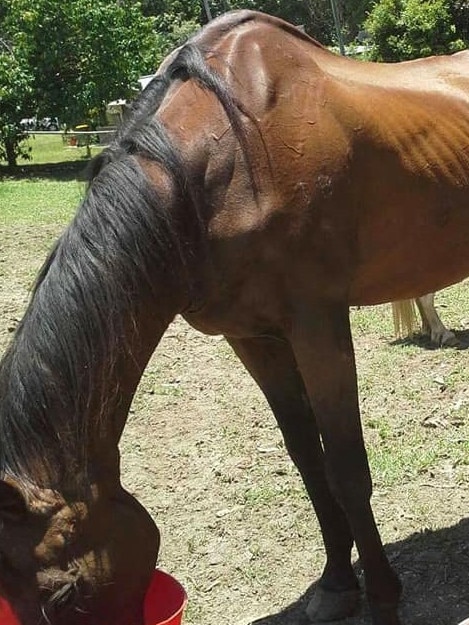
Eventually, fat green grassy cigars would slide off his tongue, through the sides of his mouth and on to the ground.
His paddock is littered with these strange tubular wads.
You haven’t truly lived until you’ve smelt a horse.
His was a delightful unforgettable musky odour, reminding me always of freshly mown hay, newly cut grass, turned earth, thunderstorms, dewy mountains, forests, long summer evenings and rain-soaked winter days.
I loved nothing more than to rest my forehead against his neck and to breath him in. In these moments, I swear his presence seeped deeply into my soul.
My partner always said she would love to bottle Frank’s scent and wear it as perfume, such was its depth and beauty.
The last time I saw Frank was a Sunday.
As always, he galloped up the little hill in his paddock, coming to a dusty sliding stop in front of his tub of feed.
His body was sleek and shiny, small puffs of warm steam shimmering off his sweaty hide as the hot spring sun slowly dropped towards the horizon.
As his fuzzy lips scooped up mouthfuls of chaff and grain, I said to him: “You’re doing alright for an old nag”.
I took a moment to breath him into my lungs before dressing him in the cotton rug that kept the cool night air from stinging his ageing body.
I don’t know why, but as I headed towards home, I suddenly needed to retrace my steps, returning to give him a lingering familiar scratch behind the ears and a gentle tap on the rump.
The next morning he was gone.
The days that followed were a blur of anguish. Countless hours spent searching paddocks, bushland, streets and slaughter yards.
Police were called, neighbours and friends mobilised and lost horse reports spread like wildfire across social media.
Despite all of our best efforts there was no sign of him — Frank had disappeared into thin air.
Balancing on the precipice between despair and hope, I convinced myself that no news was good news before convincing myself that no news was, in fact, the worst news.
When we open our hearts to animals, be they hoofed, furred, feathered or scaled, we instantly set ajar the door to happiness and to inevitable heartbreak.
They love us unconditionally — they even trust after people have tried to break them with cruelty and neglect.
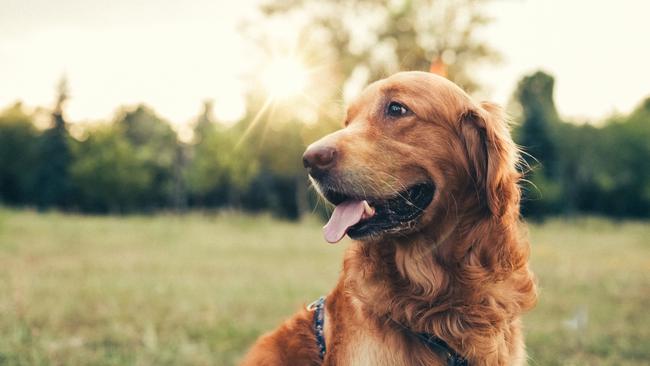
Our pets fulfil our basic human need for connection to beings that are warm and vibrant and who we know will never betray us.
Through feeding, walking, petting, grooming, talking, hugging, training and myriad other simple daily motions, we build routines around them that, in the long run, strengthen our bonds.
It is true what they say: “You never know what you have until it is gone”.
Frank was a mainstay for myself and my partner for five years.
I never doubted that he was special, but I did not realise the vital role this funny old nag played in my life until he was no longer there.
For me, Frank was a calm oasis in a world of chaos.
I spend far too much of my time supporting women and children impacted by violence and I also research and document the violent deaths of innocent Australians.
Often, I am hounded and trolled by angry men who hate that I am so vocal about gendered violence. I receive threats of violence almost daily.
I also live with the emotional scars of a childhood steeped in abuse and I have a chronic mental illness that can often cripple my mind.
There are times when my head feels so tumultuous and stressful that I struggle just to make it through each day.
Frank was a delightful respite from all of this.
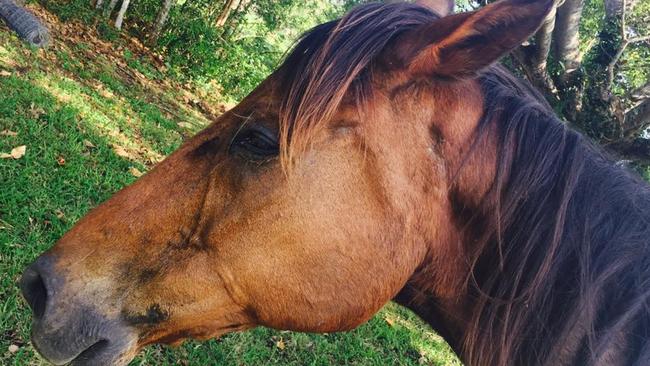
He was more than just a pet. He was a good friend — a beautiful big lump of horsey love who never judged, never questioned and never blamed me for anything. He was a shelter from a world full of cruelty and pain.
On the Friday after Frank disappeared, my neighbour called.
I knew, from her voice and awkward silence, that he had passed away.
She cried as she told me where she found him.
The hot days between his loss and his discovery took their toll on his body. We could not tell how he died but I suspect he did not go gently into the night.
When Frank entered our lives, I knew his time on earth was limited.
Yet, the optimist in me believed we would be together for a decade or two.
He was 34 — a grand age for a horse but not nearly grand — or old enough — for a being as special as Frank.
It breaks my heart that I was not there when he needed me the most and that he made his final journey alone.
A kind-hearted stranger brought his body back to his paddock for us. That same man dug his grave and laid him to rest under a stand of shady trees.
He shaped the freshly-turned mound of soil into a giant heart, telling us afterwards that he too had felt the pain of losing four-legged friends.
In time we will cover that heart with flowers and trees, a special reminder of Frank that will never die.
But right now, I would trade everything I own for the chance to rest my forehead on his neck and to breathe his beautiful scent into my soul once more.
News Corp journalist Sherele Moody is the recipient of the 2018 BandT Women in Media Social Change Maker Award and has multiple Clarion and Walkley Our Watch journalism excellence awards for her work reducing violence against women and children. She is also the founder of The RED HEART Campaign and the creator of the Femicide Australia Map.


